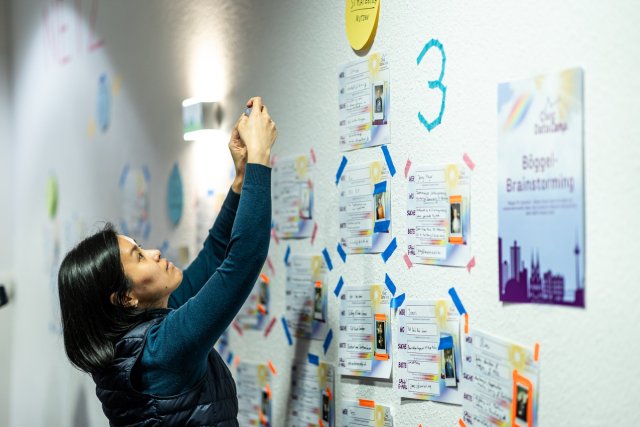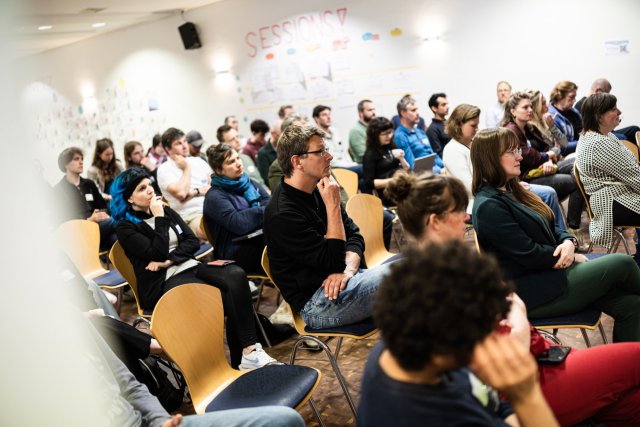Data for civil society | Hacking for the common good
This spring, an absurd data crime from the USA caused a stir . The so-called "Zizians," anarchist data specialists from Silicon Valley, once set out to save the world from a future all-powerful artificial intelligence (AI). Instead, over the years, they evolved into a suspected murderous cult and, after their arrest, became a symbol of what can happen when fear of rapid technological developments takes over. It's the classic debate that always resonates with AI: Who is developing technology for whose benefit, who should it serve in the future, large corporations or civil society – and how do you implement the latter?
On a gray and somewhat windy May day in Cologne, this is precisely what is being addressed. In the largest room of the international Caritas Center in the somewhat more upscale Sülz district, more and more people are gradually trickling in. They are drinking coffee, chatting, or, somewhat embarrassed, pressing the virtual buttons on their smartphones. Around 70 representatives of civil society have gathered to participate in an event organized by the Civic Data Lab (CDL) .
The CDL, funded by the Federal Ministry for Family Affairs and Consumer Protection (BAMFS) since 2023, aims to support civil society in the collection, use, and reuse of data. According to a 2024 Bertelsmann Foundation survey on attitudes toward data among civil society organizations, they are generally open to these new technologies (97.9 percent). However, they report a lack of human and financial resources to use them efficiently. In addition, there are data protection concerns.
The CDL now runs various continuing education programs on the topic of data, offers free online courses, and organizes so-called "data consultation hours" where organizations can receive advice on their projects. "This is also largely about imparting data skills to people who previously had no access to them," the CDL press team explained in an interview with "nd." There is sufficient demand and awareness of the services – for example, there is now a long waiting list for the data consultation hours.

The BarCamp in Cologne, along with a collaborative work platform, falls under the category of networking. A BarCamp is a type of conference where the participants themselves determine the program at the beginning. The idea is to learn from each other, as in this case about data, AI, and digitalization in a public-interest context. Incidentally, 46.4 percent of the organizations surveyed by the Bertelsmann Foundation seek exchange with others to stay up to date with technological developments.
The topics being discussed in Cologne are diverse. Representatives of social service providers will discuss how they are implementing new EU regulations on AI, a researcher from Berlin will present his project on data use for the common good, and a representative of the Hamburg "Self-Help Association for Medically Injured Persons" will seek input on the association's "unsustainable, analog business model."
After everyone has presented their ideas and marked their preferences on a wall of the room using colorful stickers, the group splits into small groups. A microphone is set up in the "Fisimatentenraum" (playroom). The debate there is recorded, later transcribed and summarized using speech recognition software. It's essentially an experiment amidst the networking. Benjamin Degenreich from the startup Förderfunke presents a project. The goal is to find a way to proactively inform citizens about government services and relevant offers – maximum openness and maximum data protection are the plan, Degenreich told "nd."
"Actively keeping citizens in the dark means undermining democracy."
Benjamin Degenreich Funding Spark
A classic example of social benefits not being claimed by those entitled to them is child benefit. Therefore, the reform of the child benefit system by the coalition government aimed primarily at providing access to those who were already entitled to it. The discrepancy between theoretical and perceived entitlements arises from hierarchies of knowledge, from classified and racialized access, or from a lack of time on the part of parents or guardians. Cynical voices also argue that these information hierarchies save the state money. "Actively keeping citizens in the dark means undermining democracy," says Degenreich.
In the Cologne panel, nonprofit organizations shared their experiences from consultations. They welcomed the startup's initiative, but also raised concerns. For example, regarding the Toeslagenaffaire (German: Child Benefit Affair): a Dutch scandal in late 2020 in which the government accused primarily migrant families of welfare fraud and demanded the repayment of child benefits.
The Toeslagen Affair is considered to be the first case in which a government ultimately had to pay compensation for automated data-based discrimination against citizens. Therefore, says Degenhart, the Förderfunken project focuses on structured data instead of LLMs, i.e., large AI-based language models. "People should be able to understand why they are entitled to compensation or not."
"In principle, civil society should not simply run after the economy."
Leo Preu Civic Data Lab
CDL's consultations focus largely on jointly considering how artificial intelligence can be appropriately applied to the respective projects. But it's also about recognizing the fine line between where the use of artificial intelligence makes sense and where it doesn't, explains CDL's Leo Preu during a vegetarian lunch, between falafel and various salads. "In principle, civil society shouldn't simply follow the economy."
For example, an anti-bullying organization is considering using a chatbot for online counseling because its few volunteers are only allowed to work online after completing a few training sessions. This is a difficult project to implement. First, the bots need to be extremely well-programmed to avoid conveying problematic messages to young people in the future. Second, the question arises: Why do people only trust online counseling after a learning phase, but want to deploy AI right away?
Are we now granting AI more empathy than humans? In an afternoon workshop, Preu delves into the debate in more detail. The panel discusses the anthropomorphization of AI, i.e., its humanization, and its consequences for relationships, isolation, and civil society. Could this, in the worst case, end like the Zizians mentioned above?
Beyond these thought experiments, the BarCamp is brimming with positive examples of the use of data for the common good, including those that have been implemented over the past two years with the help of the CDL. Democracy projects that bring young people closer to politics, concepts similar to the translation platform DeepL that transform texts into gender-inclusive language, and platforms that connect regional choir projects. The lesson from the day: The new technologies can have great benefits – if they are used consciously.

nd-aktuell




